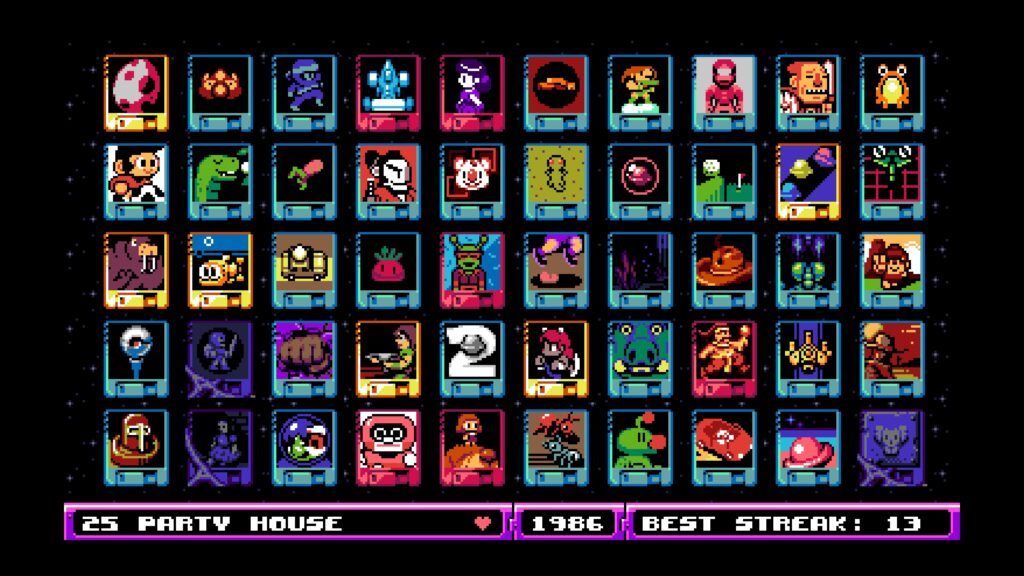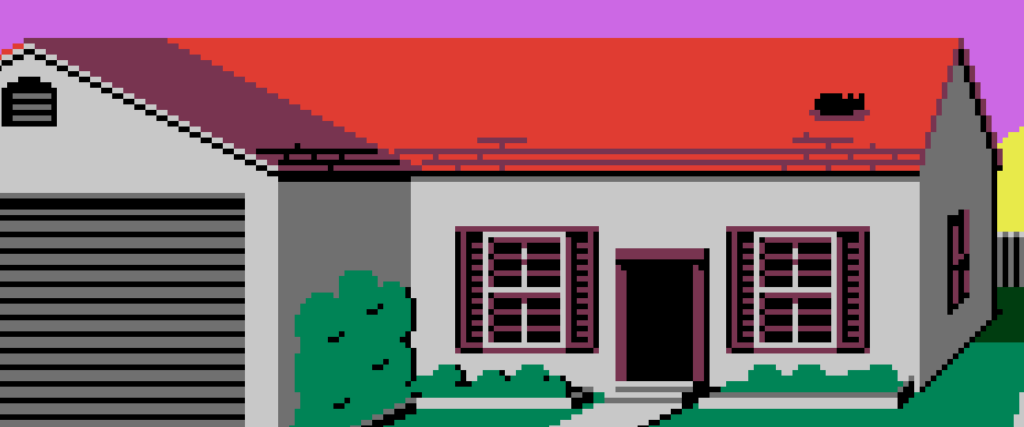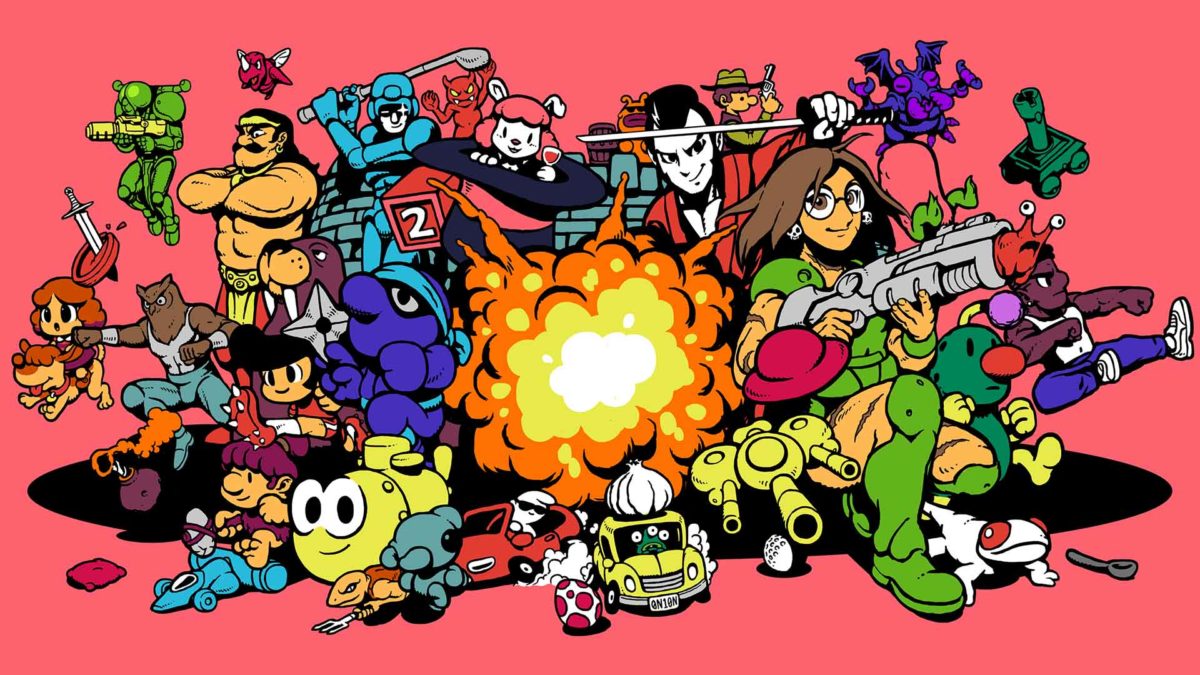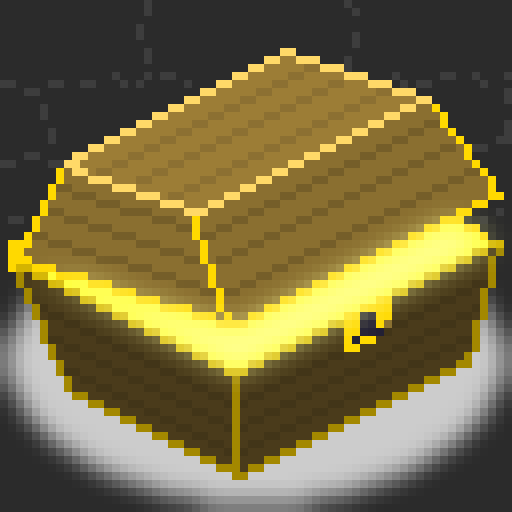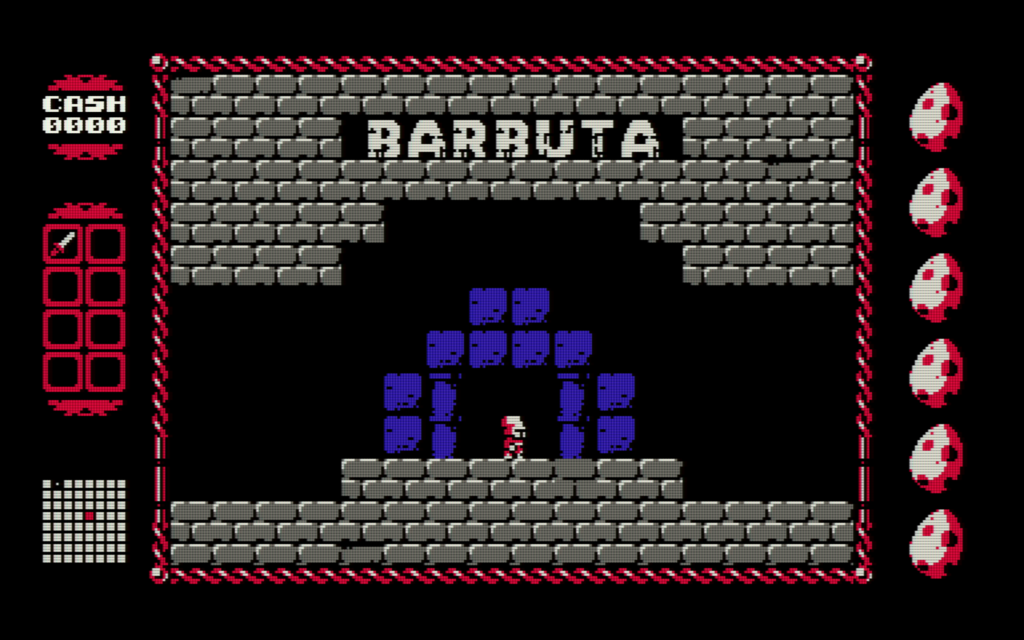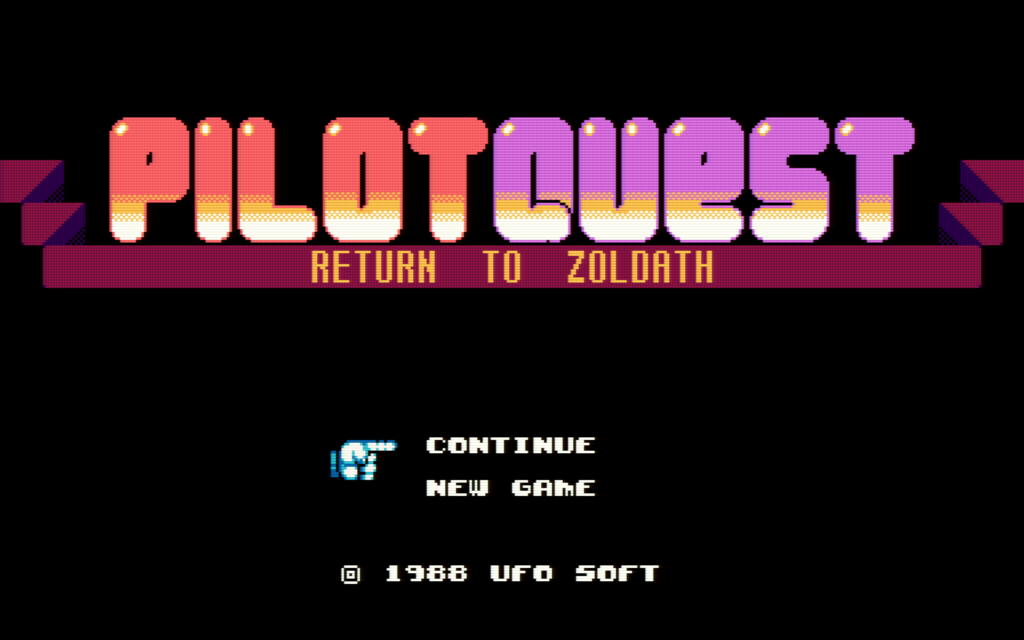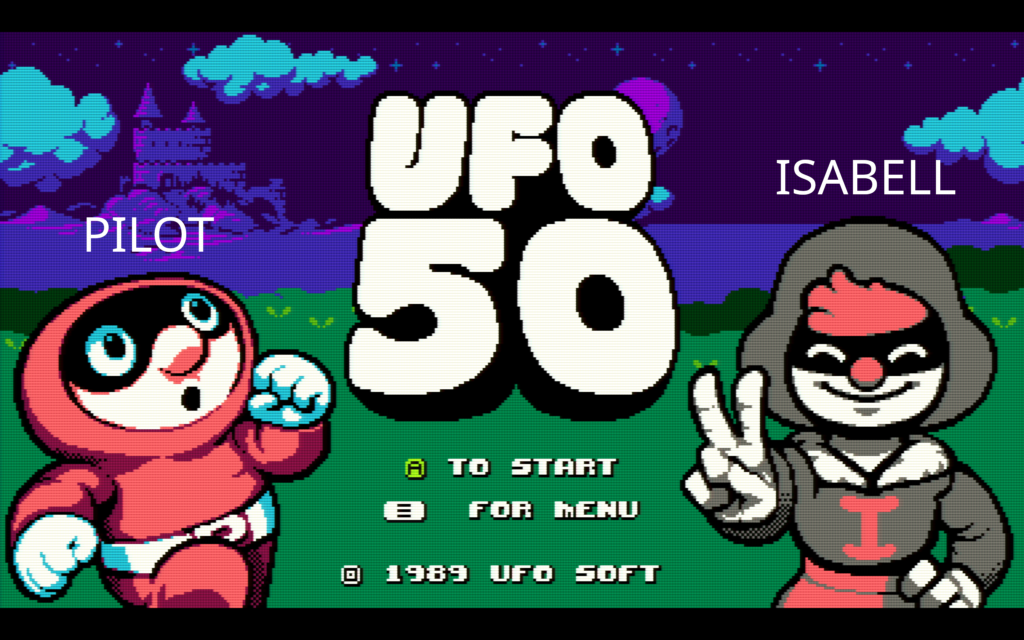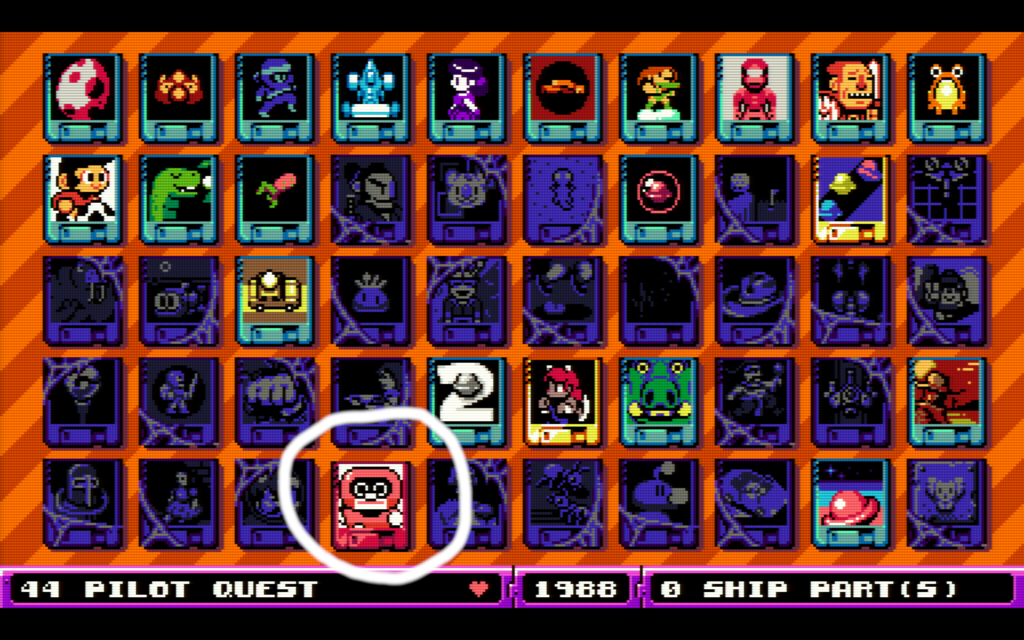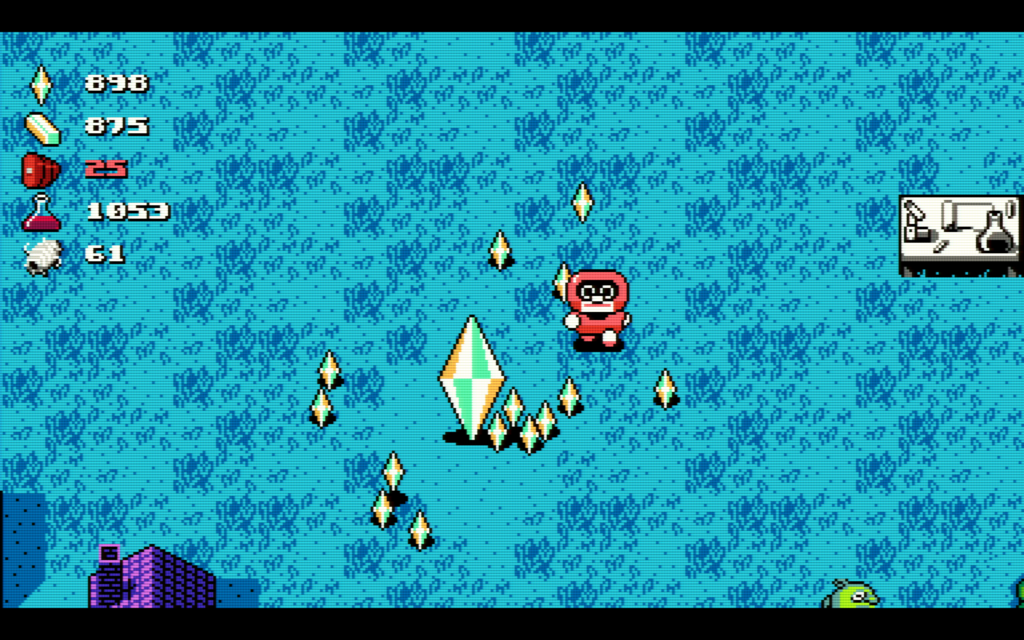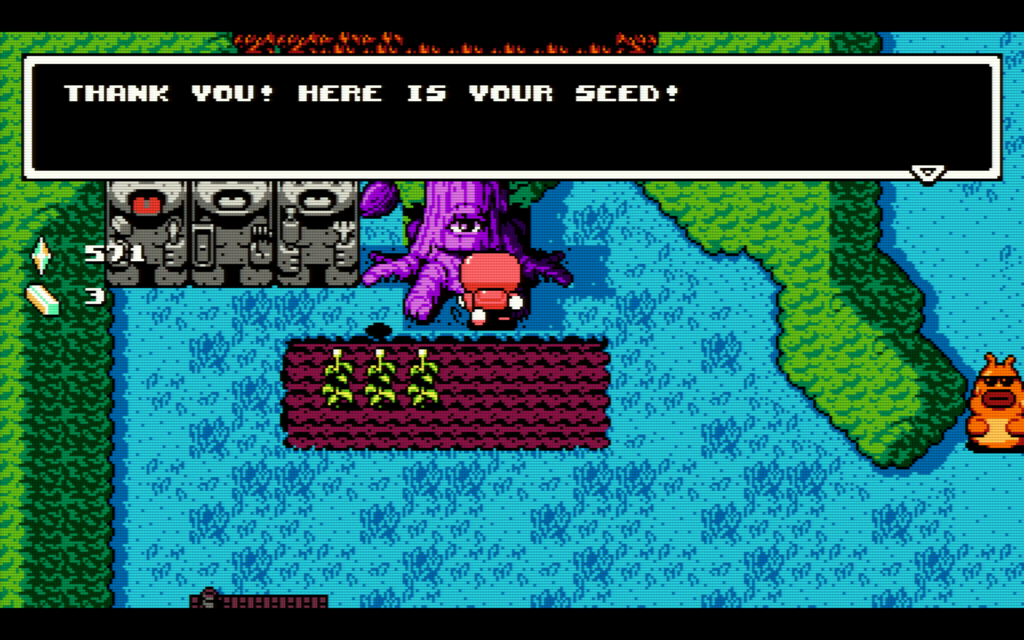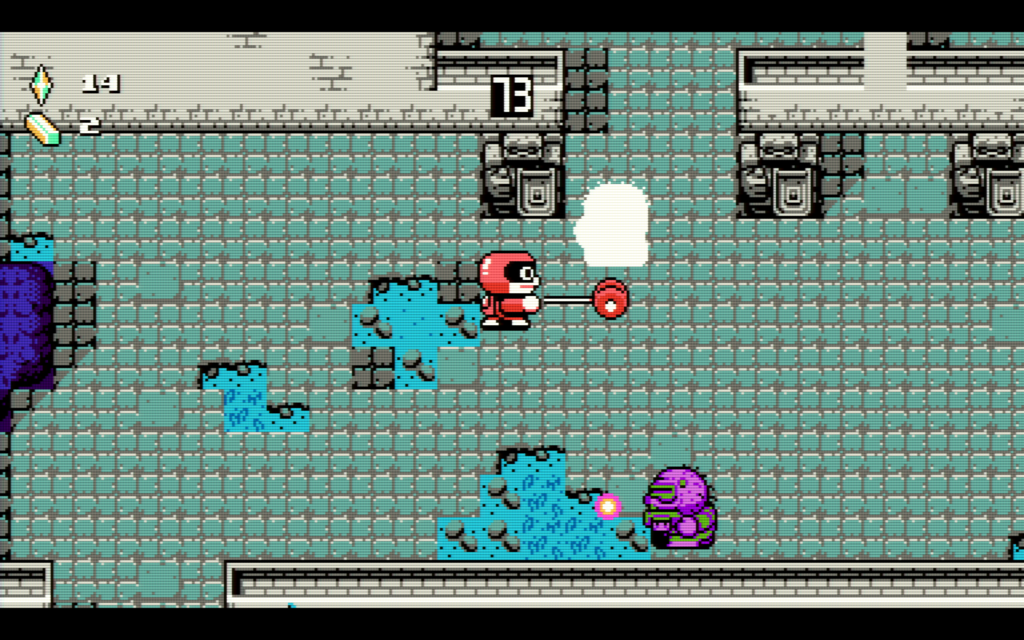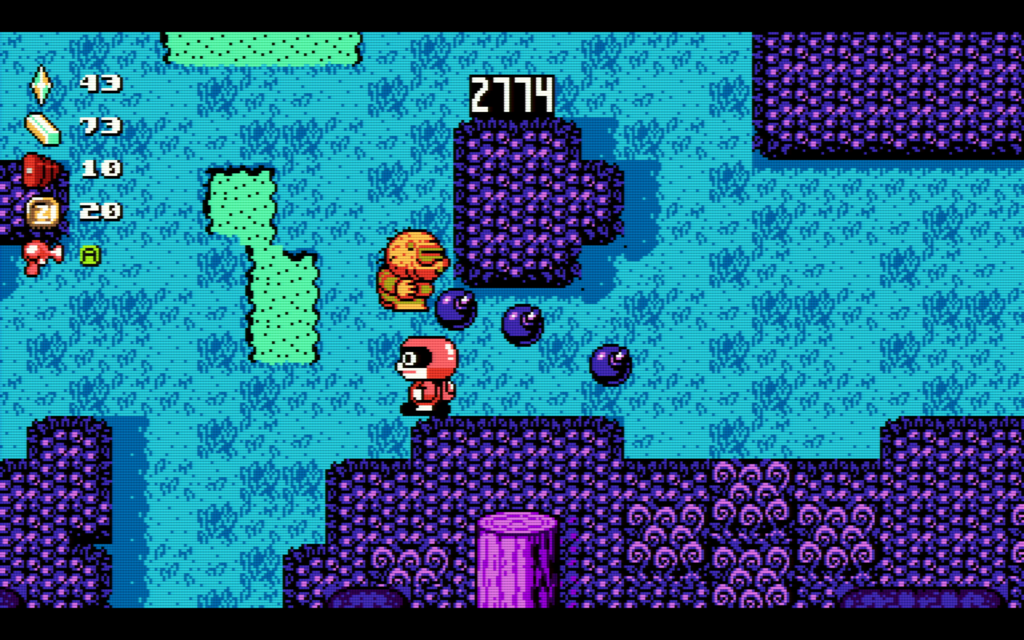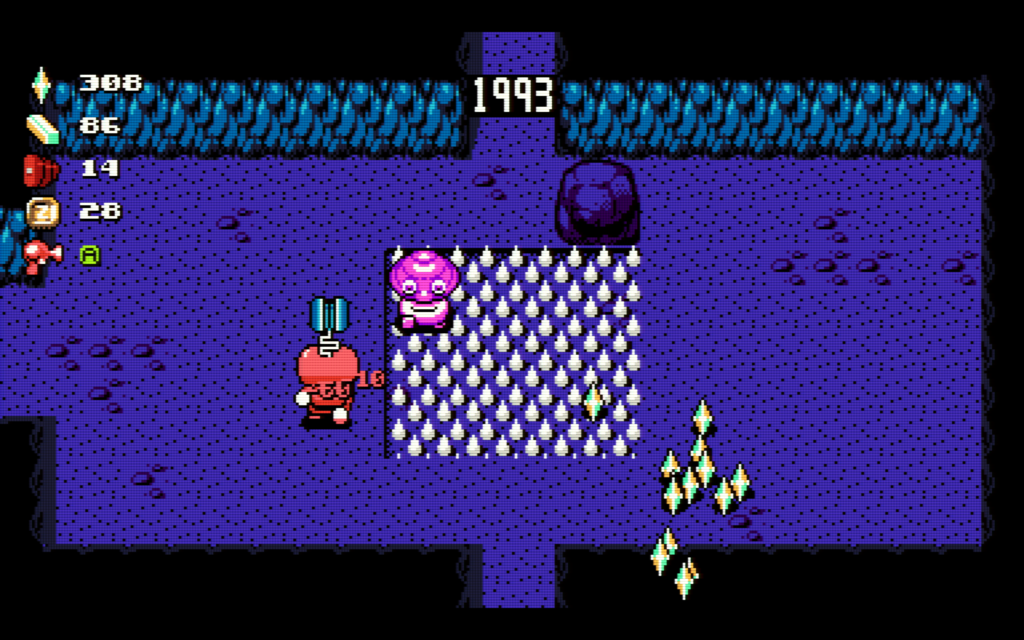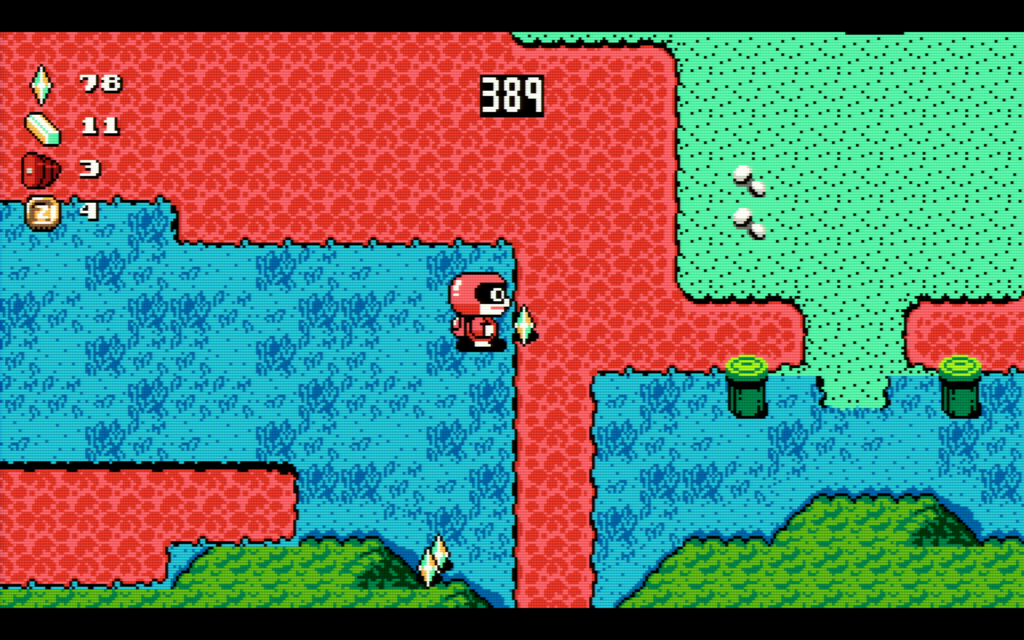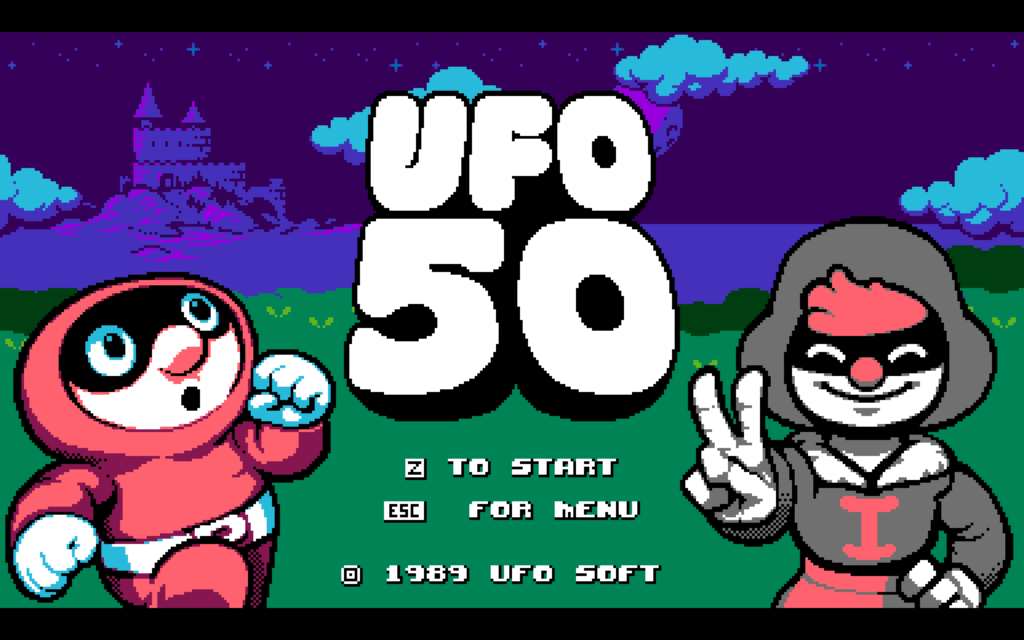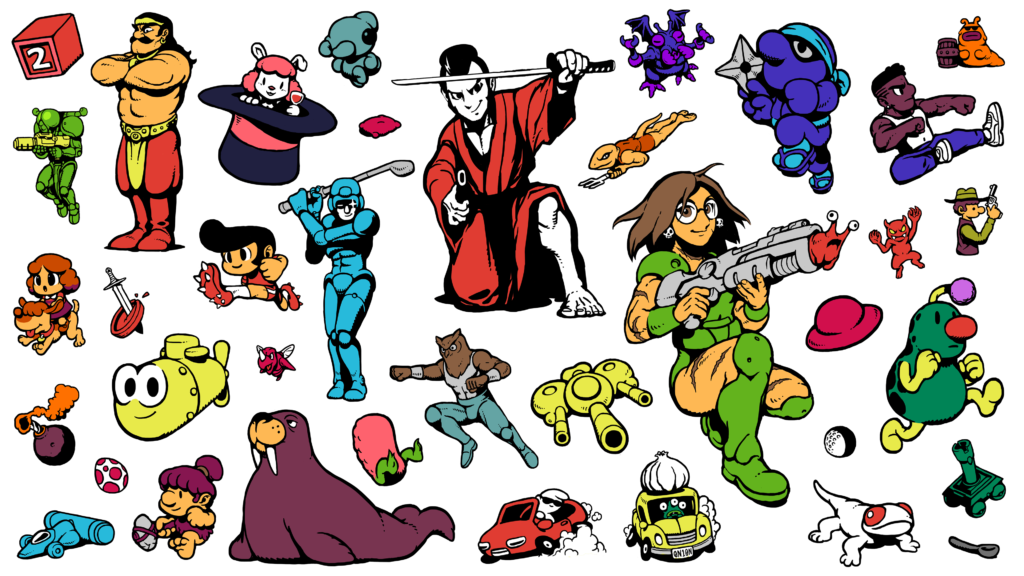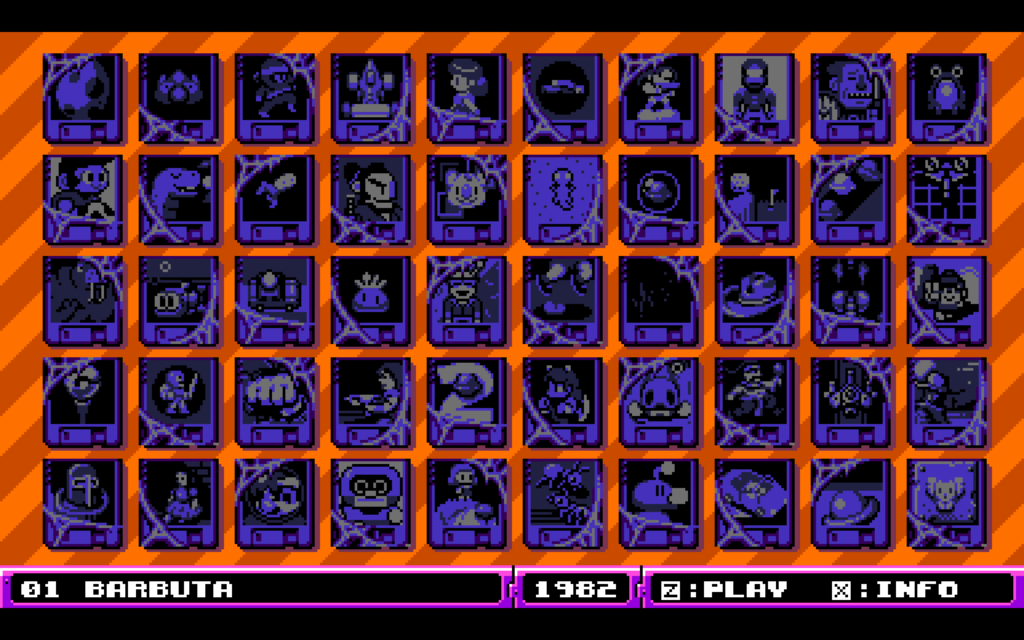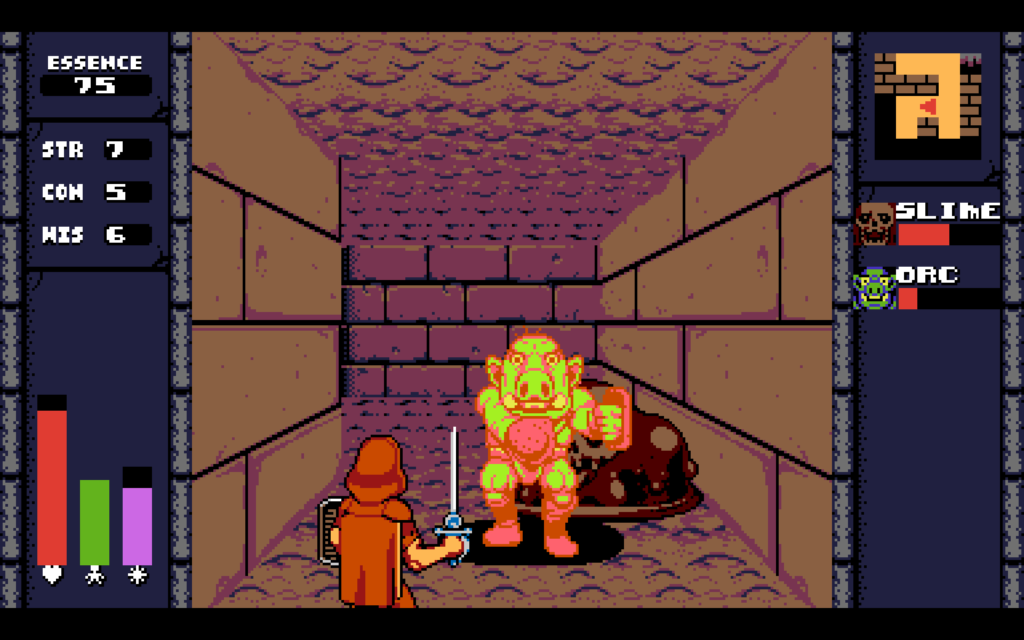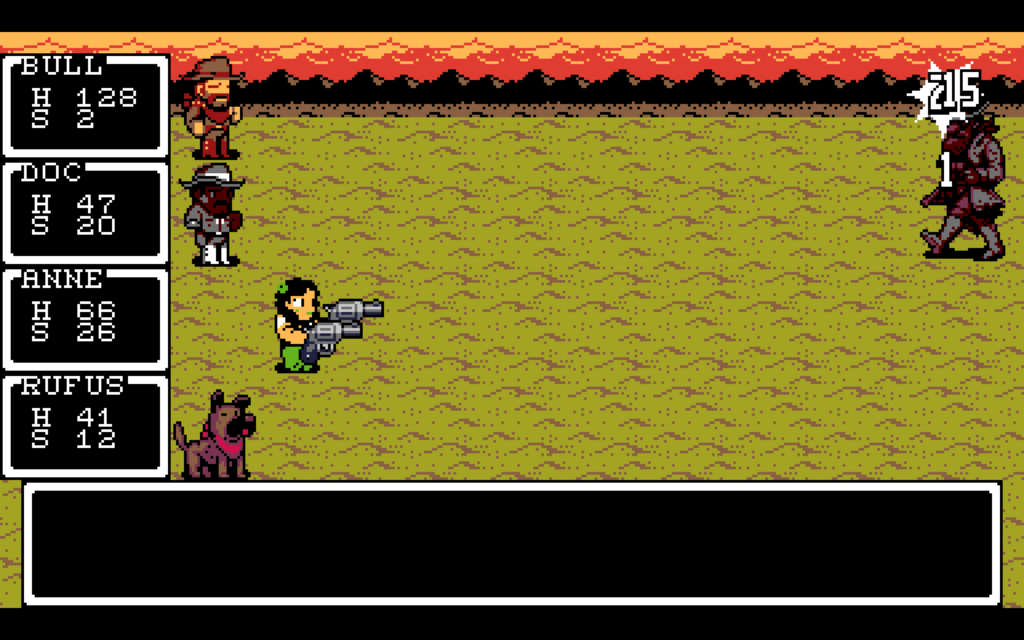EDIT: I misunderstood how bringers work, especially Celebrity. I’ve corrected my description in Celebrity’s section, way down below.
It’s a really long one today. A long long guide for a short short game! Many of you will probably just skip it, but if you’ve played this game yet you might be really interested in this one, and if you haven’t, maybe you’ll decide you should be. And it might serve as a good introduction to the idea of deckbuilders generally, because it’s really simple but fun!
There are many awesome games in UFO 50 (Valbrace, Rakshasa, Pilot Quest, Magic Garden, Attactics, Onion Delivery, Mini & Max) and at least as many really good ones (Paint Chase, Overbold, even Barbuta I’d say). Beyond that there’s an extensive metagame involving a secret 51st game (Miasma Tower) and a plethora of cheat codes, but I’m going to set all of that aside and ask hey, have you played Party House?
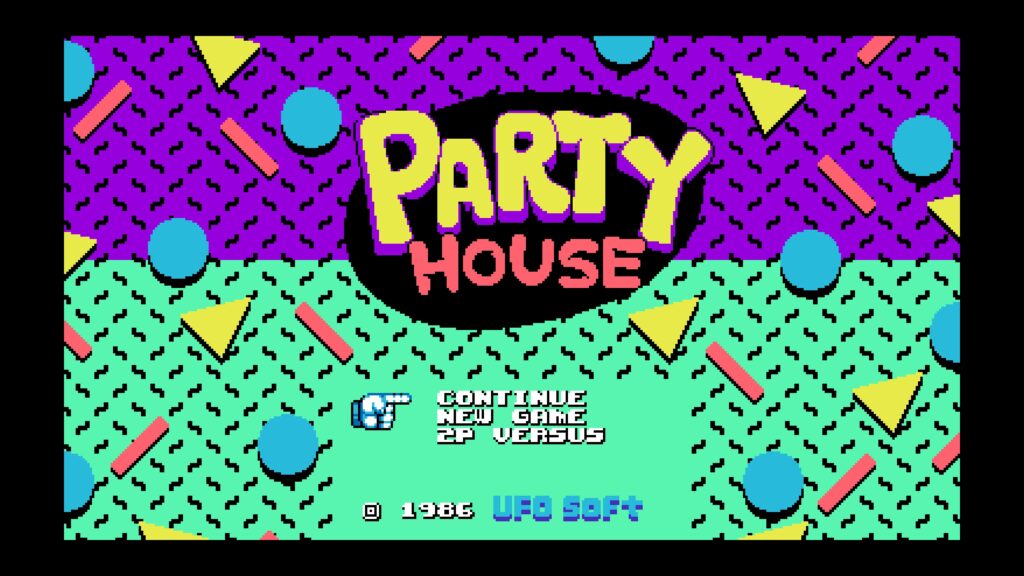
Party House is a simple, remarkably pure deckbuilder. I call it pure because there’s actually no computer-requiring elements to it. It could be a physical deckbuilder. Mossmouth could, if they wanted, license a set of Party House cards for people to play offline, with counters to track values and a mat for the House, and the game could work exactly the same way. You’d probably have to have a mat with tracks on it to handle cards changing value, and maybe assign names to individual cards to help with that, but it could work.
What playing it on a computer gives you, besides not having to shuffle the deck yourself and allowing cards to change values easily, is rapidity: one round of Party House can be over in less than ten seconds, a full game in mere minutes. That’s really uncommon for a game with its depth, and makes it easy to instantly play another round if a game goes badly.
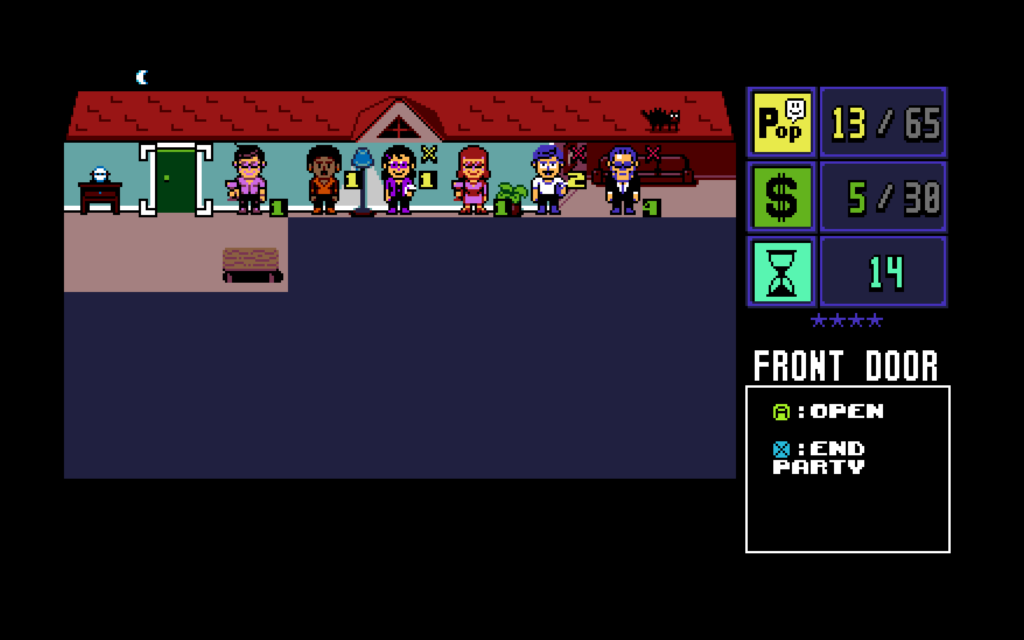
You’re in charge of a house that throws parties, one a night for 25 nights. Guests arrive one at a time, randomly chosen from your rolodex, which is your deck. It’s just like drawing new cards into play. You can keep opening the door and admitting new guests until the house is full, or you can stop at any time and end the party for the night. The people in the House when the party concludes determine what rewards you get for it, measured in Popularity (Pop) and Cash. You use Pop to buy new guests for your rolodex: new cards for your deck. You use Cash to expand your house: more space to play cards each night. The first expansions are cheap, but the bigger it gets the more expensive each new space becomes. A few guests allow you to perform special actions, like booting guests from the party, summoning specific guests, and more.
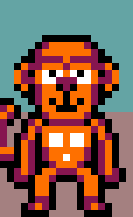
But beware the existence of Trouble! Trouble is a special property of some guests, denoted by a red X. Your party can only survive two Trouble guests at once. If you have two and draw a third the police show up, shut the party down for the night, and you don’t get anything for it. Of the 10 guests in your starting rolodex for a game, four of them, the Wild Buddies, are Trouble, and there’s no way to remove guests from your rolodex deck except temporarly, so they’re a burden you must always be ready to bear. Some of the guests you can add to your deck are themselves Trouble, but they tend to be very valuable in terms of Popularity, Cash, or both.

To win, within the 25 nights allotted you must host a four-star party, meaning a party with four “star guests.” Star guests are all much more expensive than other guests, and don’t have many upsides relative to their cost. But to win, you must not only have four of them, but you must get them all into a single party. The more guests in your rolodex beside stars, the less likely you’ll draw all four starred guests. Some guests give you ways to make it more likely you’ll get four stars in play at once, but there’s no guarantee they’ll even be available in many scenarios.
Like most deckbuilders, the consequences of adding new cards to your deck are not always immediately obvious, and since there’s no way to remove guests once added, the early choices you make to get started can get in the way in the end, when you’re hoping to get that last star to seal your win on the 25th night.
Party House has five set scenarios, each with its own collection of guests to acquire, and a Random Scenario that throws together guests from the others. This comprehensive strategy guide mostly focuses on the Random Scenario, but it should help with the other scenarios too. To “win” at Party House, for the purposes of UFO 50s metagame, you just have to finish the five set scenarios, but to get the “Cherry Goal,” the victory with honors, you have to win five consecutive Random Scenarios. it will seem daunting but it’s definitely possible: my own best win streak is 13 games.
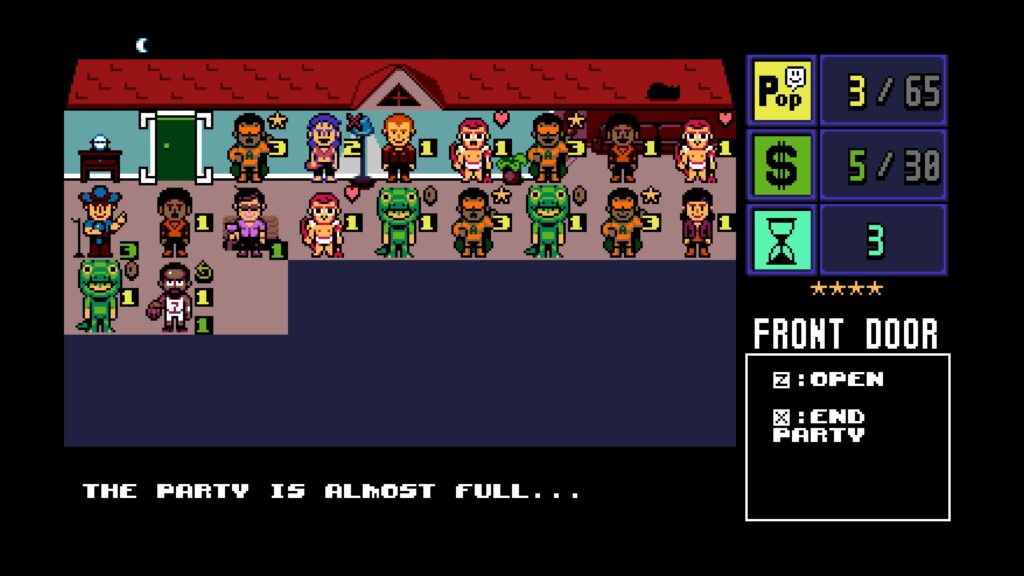
By the end of a game, you have to have four stars in the same party. The little gauge beneath the Pop/Cash/Time counters indicates how many stars you currently have; if it doesn’t show four yellow stars, you’re no there yet. This means:
- You must have four star guests in your rolodex in the first place. You can have more, and the star guests are the only ones that don’t limit you to four.
- They must all be there at once. If you have a lot of guests in the rolodex this could be very unlikely, or you could have more house space than possible guests and it’ll happen naturally, though this happens but rarely. There are ways to make this easier, and that’s a recurring theme with some of the guests.
- Star guests are much more expensive than the other guests, so you’ll have to build up a good income of Popularity from other guests before you can tackle that.
- To have space for a lot of Pop guests, you’ll have to have a large house, and in turn a big income to fund that house.
- And you’ll have to do something about your Trouble guests, or they’ll decrease your Pop and Cash income or even bring it to a halt.
I’m about to launch into a huge discussion of every guest in the game, and the situations where they work best and worst. Before that, it’s worth saying a few things about general strategy:
- Your first priority should be either saving up for a single really good guest, if one’s available, or expanding your house. Expanding your house is your main goal at the start of the game, but there are some guests that really help you out if you get them as soon as possible. If this is the case, you should start working on getting your Cash up, and using that to expand your house, immediately after.
- It’s not good if your guest pool gets too much bigger than your house. The more guests you have, the less often each show up. If you have twice as many possible guests as house spots, then each will turn up about half the time.
- On the other hand, having too few guests means that Trouble becomes a bigger issue. If you don’t have many ways to handle Trouble (here I call them mitigators) then having some more guests, relative to house spots, is okay, though it will make getting all your stars in later harder.
At the start, your rolodex consists of 10 possible guests: four Old Friends worth 1 Pop; four Wild Buddies worth 2 Pop but with Trouble; and two Rich Pals that grant no Popularity but pay you 1 Cash. Beginning houses have 5 spaces for guests. A new space costs $2, but every time you buy one the cost goes up by 1, to a maximum of $12 per space. The largest the house can get is 34 spaces, enough to fill the whole screen, but you’ll never reach that state unless you’re focusing on house expansion to the exclusion of all else, and you’ll probably have to play a custom game to do it as well. (See the section at the end on on codes. And if you do manage to get your house to maximum size, there’s a fun easter egg that calls back to the rest of UFO 50.)
Some other people talking about Party House: Paste Magazine, Popcar’s Hub, braktheman (Youtube, 33m)

OLD FRIEND
Cost 2 – Earns 1 Pop
You start with four Old Friends in your ‘dex, and they’re one of the guests that are guaranteed to be buyable in every game, unless you’re playing a Custom Scenario. Unless Mascot is also in the game, Old Friends are mostly useful for getting started, and little else. At a mere 1 Pop per party, it takes a very large house for Old Friends to even come close to being worth it. The only other use case I can come up with is to pad out your rolodex so as to make Trouble come up less often, and you can usually find something better to fill that role. Other than Mascot, the one virtue of Old Friend is they’re the cheapest guest, at only 2 Pop to buy.
Synergies:
Good: Mascot, scenarios with no trouble mitigators or Pop
Bad: Nearly everything
WILD BUDDY
Unbuyable – !Trouble! – Earns 2 Pop
Wild Buddies are the spoilers of Party House. You always start with four of them, giving you a terrible Trouble-to-guest ratio in your starting deck. It only takes three Trouble to bring out the police, and on the first draw of the first night, you have a worse than 1-in-3 chance of getting Trouble right away! Experiments reveal you have a greater than 25% chance of the police crashing your party if you just open the door five times the first night, with the only consolation being they each bring you an okay (not great) 2 Pop, if the cops don’t show up.
But let’s look at the flip side. Wild Buddies are the only guest you can never buy. Wild Buddies are the only guest where all four of them have custom graphics. (Indeed, randomly the Wild Buddies, and Old Friends and Rich Pals too, in your rolodex will get names! It’s really confusing the first time that happens, but the games always match the same graphics.) Because all games have four Wild Buddies, your Writers and Bartenders always have a solid base of bonuses to offer you. And there’s only four Wild Buddies.
But back on the face side, because of those Wild Buddies, you always must be careful. Even if you fill the rest of your rolodex with Hippies, Cute Dogs, Counselors and Unicorns, experience has shown that there is always a significant chance that you’ll pull three Wild Buddies before any of them show up. Indeed, you’ll be surprised by how often the first three draws of an entire party are Wild Buddies, it seems to happen at least once every few games. The nature of Trouble is, the bigger your rolodex in general, the less likely you are to draw it, but the bigger your house, the more likely it is to show up. And if you’re in one of the surprisingly many random scenarios where no other mitigators are available, you may even have to rely on Security or Wrestlers to boot them before they climb up on the roof and freak out the cat by playing Motorhead at top volume.

Freaks out if you’re one Trouble away from losing the round!
One more thing about Trouble. If the cops do show up, you’ll have to pick one of your guests to take the blame and go to jail for a night. (The game says they’re temporarily banned for one party, but it’s mandatory nature implies a carceral event.) This is a good thing usually: it’s the only way to get any guests out of your deck, even temporarily. It’s almost always best to pick a Wild Buddy to take the fall, since they’re worth relatively little and are a cause of Trouble. They don’t seem to mind.
I don’t know why this is, but all four of the Wild Buddies have purple hair.
Synergies:
Good: Writer, Bartender, peacemakers, Councilor
Bad: Dinosaur, small decks
RICH PAL
Cost 3 – Earns 1 Cash
The whole deckbuilding genre was kicked off by the physical card game Dominion and its many many expansions, and in Dominion there is a famous, or infamous, strategy they call Big Money.
Big Money works like this: if you can afford to buy the best victory point card (Province), then buy it. Otherwise, if you can afford to buy the better default income-building Treasure cards (Gold or Silver), then do that, but do nothing else. Pass your turn if you have to.
Big Money isn’t a great strategy itself, but it’s interesting because it’s a baseline: it only uses cards that are in every game of Dominion, and if the cards available to buy in your Kingdom are so-so, it can even be a viable strategy, bringing you a winning margin usually within 17 turns. Unfortunately (but fortunately for the design of the game) any viable synergy between the other cards in a multiplayer Dominion game will defeat Big Money, either winning the game faster or interfering with it and slowing it down.
Buying out the Rich Pals, using Cash to expand your house, then saving up Popularity for star guests is the Big Money strategy of Party House. You can always do it, it’s a bit better than you’d expect, but it’s not nearly enough to win games.
Rich Pals are useful for buying those important early House upgrades, but once the cost of renovations gets up to the $7 range you’ll be expanding less and less, and your Rich Pals will be more getting in the way of better-earning guests. Each Rich Pal you have is that less often your better guests can show up, and you already start with two.
But this all assumes you HAVE better income-generating guests. It’s possible to get a random scenario where your only moneymakers are Rich Pals. If that’s the case, you’re best off loading up on Rich Pals for the income. In fact, it’s sometimes best to buy those early Rich Pals anyway, because it’s so important to get the first House upgrades as early as you can. This is why it’s important to stop and look at the guests in your scenario immediately after the first party, to figure out whether you should be going for a big deck or a small deck strategy. Big deck usually means loading up on Rich Pals; small deck, getting fewer, but better, earners instead.
Synergies:
Good: big decks
Bad: small decks, other money cards

DRIVER
Cost 3
Action: Summon specific guest
Drivers themselves don’t give you any income. No Pop, no Cash. And because even their Action summons another guest, if you draw one as the last guest of the party (and have no way of booting anyone), it’s basically a wasted draw.
But, as with many guests, if there’s a good synergy with another available type, they can be very powerful, and Drivers synergize with lots of guests. If there are Dancers, you can use them to call one and make all the Dancers already at the party more valuable. You can call Stylists to increase the value of other guests more often, you can call Climbers to make them rise in value faster, you can call peacemakers to counteract Trouble or Counselors to negate it entirely, or Writers and Bartenders to capitalize on the Trouble you have, or even bring on Trouble (if you can handle it) to make them more valuable. And in the endgame, when you have four stars in your rolodex and are desperately trying to get them all to arrive, Drivers can be the most important guest, although for that use you probably should hold off on buying them until the end.
If you buy Drivers, try to get as much use out of them as you can. Try not to let an appearance go by without summoning someone. Just denying Trouble one more chance to arrive is enough.
Synergies:
Good: Mascot, Writer, Bartender, Dancer, Stylist, and especially Climber, star guests
Bad: low Pop scenarios
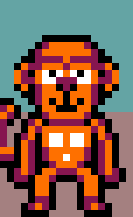
MONKEY
Cost 3 – !Trouble! – Earns 4 Pop
Monkey may seem like an incredible bargain, and in a sense it is. It earns you more Pop than it costs!
Monkey is the cheapest Trouble card you can buy. It’s easy to overlook because it’s Trouble, but if you make sure to end the party the moment the second Trouble arrives, depending on when that is, Monkey can be worthwhile, especially early in the game. 4 Pop for one guest is amazing any time, it’s what you’re aiming for with Dancers after all, and Monkey ties for the highest value flat Pop guest.
But later on…. Monkey can easily become a monkey on your back. The most dreaded event in House Party is when your first two guests in a round are both Trouble, because the chances are pretty good you’ll get the third trouble before you can get anything you can do about it, but if you end the party immediately you’ll get barely more than if the police show up. Additional Trouble makes these occurrences much more likely.
Synergies:
Good: Trouble mitigators, scenarios with little Popularity, Writer, Bartender
Bad: Nearly everything, but especially scenarios with no mitigation
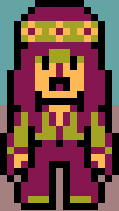
HIPPY
Cost 4 – Earns 1 Pop
Cancels one trouble (peacemaker)
Hippy is the cheapest peacemaker guest, essentially worth -1 Trouble. That’s not accurate though, because peacemakers don’t decrease the value of Writers or Bartenders, and so they synergize very well with both those guests. What peacemakers like Hippy do is increase your capacity for trouble. Instead of only being able to survive two, you can now stomach three, and the effects of multiple peacemakers stack with each other. Assuming no other Trouble in the ‘dex, at two Hippies, so long as you draw them before you reach three Wild Buddies, you cannot lose the round from Trouble. There’s always the chance that the Wild Buddies will arrive before any peacemakers, but it’s still a substantial reduction in the danger level of the game. And they’re cheap, too! The drawback is they aren’t worth much Pop, but you do still get a little. I usually buy out all the Hippies pretty early in a game.
Synergies:
Good: Scenarios with lots of Trouble guests, Dinosaur
Bad: Cute Dog (same effect but more Pop)
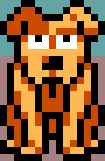
WATCH DOG
Cost 4 – Earns 2 Pop
Action: Peek at next guest, and optionally reject them (peeker)
Peeking is an action: a special one-use optional ability that you can use at any time after that guest arrives. Actions can’t be used after the police or the fire marshal shows up, but if the action is still relevant they can be used after the party fills up. Actions can only be used once for each guest with an action, and if something sends a guest with a used action outside and they return later, the action is not replenished. The only thing that can replenish a guest with a used action, short of moving on to the next night, is the Cheerleader’s action.
Peeking lets you see what the next guest to enter the party will be, and lets you optionally refuse to allow them entry. You only get one look, and only one chance to refuse entry, per peek. Since there’s no telling before you peek if the next guest is low-value, high-value, or Trouble, it’s random how useful this will be. It isn’t a foolproof defense against Trouble, but it can be useful to prevent party overflow from bringers if you use it before admitting the last guest.
You can get a sense of the developer’s opinion of the relative value of the various guest attributes by their cost. Hippies and Watch Dogs both cost 4, but at that price, peacemaker comes with 1 Pop, while peeking comes with 2 Pop. So it seems obvious that they consider peeking to be a lesser power than peacemaking, which makes sense. In fact, at a cost of 4 Pop for a 2 Pop guest, Watch Dog is a modestly useful Pop earner. It probably won’t get you though to the end game all by itself, but it can be a good way to help fill out your rolodex if you’re going for a big deck.
Peeking is technically a Trouble mitigation, since you have the chance to block a Trouble guest if you find one, but it’s unreliable. In small decks, though, it can pay off frequently enough to be worth it for that.
Synergies:
Good: Greeter, guests with powerful benefits, Trouble, big decks
Bad: Better sources of Pop, Spy

SECURITY
Cost 4
Action: Evict one guest (booter)
Security is one of the least useful guests in the game. It has an action that lets you remove one guest from your deck for the rest of the party. Evicted guests can’t return until the next night.
Functionally, the only thing Security is good for is getting rid of Trouble. It’s not useful for income, because it doesn’t provide any. It’s not useful to make room for other guests, because Security himself takes up a space. You might as well have Security evict himself, which he can do, and might as well, as he’s probably the least-earning guest at the party.
If Cheerleader is in the game, then you might be able to rig up a mass eviction scheme, where you have multiple Security evict multiple people, then have a Cheerleader refresh them all for another go round, but why? Eviction isn’t really that useful, unless maybe you’re trying to go through more of your rolodex trying to reach four stars, but there’s almost certainly better ways to go about that. A better possibility, if it’s available, is using Ghosts, since they’re star guests themselves.
Synergies:
Good: Trouble without other mitigation
Bad: Any other way of dealing with Trouble
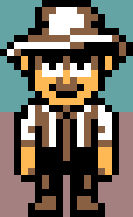
PRIVATE I.
(Private Eye)
Cost 4 – Earns 2 Pop, costs 1 Cash (at the end of a party)
Action: Summon specific guest (summoner)
A Private Eye is a Driver that also gives you 2 Pop, at the cost of 1 Cash. In games with both, that’s eight extra chances to summon Star Guests, which can all but seal your win. They’re usually a bad choice at the start of a game because of that -1 Cash aspect, which can greatly slow growing your house. They shine in the mid game, where they both help speed Pop growth and let you bring in synergistic guests when needed. In the worst case, you can usually bring someone with a decent Cash or Pop bonus.
If you have a Cash penalty you can’t pay, you lose 7 Pop per missing Cash. You don’t suffer any additional penalty if you run out of Pop, and you can’t go into negative Pop.
Synergies:
Good: Everyone Driver helps, Private Eye helps too.
Bad: In low money games, multiple Private Eyes can sap so much cash that you can’t expand your house enough to get four star guests in at once.
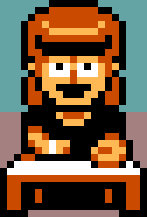
TICKET TKR
(Ticket Taker)
Cost 4 – Earns 2 Cash, costs 1 Pop (at the end of a party)
Generally in the early to middle game Cash is more valuable than Popularity, so long as you don’t lose too much. Ticket Taker is best paired with fairly high-Pop guests, but sometimes it’s your only source of income besides Rich Pals.
If you have a Pop penalty that you can’t pay, nothing happens, but that almost never is a factor with Ticket Taker. Ticket Takers are the only negative Pop guest.
Synergies:
Good: Low Cash games
Bad: Low Pop games
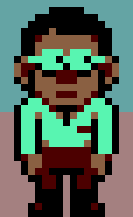
INTROVERT
Cost 4 – Earns 1 Pop
+1 Pop for every empty space in the party
This may seem like a pretty bad guest… and he is, really. Introvert is only ever worth it if you end the party before filling it up. Introvert can help take the edge off if you have to end a party early before the police arrive, but even then, the Introvert has to show up before the police do, and your recompense is like one Old Friend per empty spot, which isn’t a great value. You can make Introverts useful if you get multiple copies in the party, since each increases the value of those spaces by one. But you still have to get them in before you fill too many spaces to really help. I’ve never found a good use case for Introverts in Party House.
The best use case I can come up with for Introverts is if they score early, from using a Photographer or happening to trigger one entering the door from a Greeter, but both require substantial amounts of luck to make happen. If you manage to Greet an Introvert coming in, or to use a Photographer on one in a mostly empty house, it’s possible to receive gigantic payouts from an Introvert, but the big houses required to make that happen usually take a whole game to build, and a small rolodex to increase the chances of getting it to work.
Synergies:
Good: Trouble, Greeter, Photographer
Bad: Big decks, Comedian, Mascot
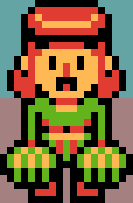
CHEERLEADR
(Cheerleader)
Cost 5 – Earns 1 Pop
Action: Refreshes all used non-Cheerleader actions for current guests
Cheerleaders are highly situational. If you’re in a game with no good actions they’re basically expensive Old Friends. In certain circumstances, though, they excel. A Stylist in a party with four Cheerleaders is essentially four Stylists, and you only get charged for one. FOUR Stylists in a party with four Cheerleaders is sixteen Stylists, which is nearly enough to max out two guests at 9 Pop each, which can be a game changer. The potential of that setup is allayed by the difficulty of getting all of them bought and in a party at once. Summoners can help with that, but then you’d have to have room for them too. Some luck is always needed in making effective use of Cheerleaders, but the more nights left in your game (or the more times you shuffle), the more chances you’ll have for a good Cheerleader/Stylist combo to become possible.
Cheerleaders have other users too. They work best with action guests that have money costs, since you’ll only have to pay for them once, but they recharge all non-Cheerleader guests currently in the party.
Synergies:
Good: Stylist, Photographer, summoners
Bad: Low action scenarios

MASCOT
Cost 5 – Earns 1 Pop
+1 Pop for every Old Friend in the party
Mascot is the reason, other than if your scenario has very few Pop sources, that you might want to load up on Old Friends. Even then, a single Mascot turns each under-performing 1 Pop Old Friend into an average-performing 2 Pop one. And the Mascot itself is really just worth 1 Pop. To make Mascot pay off, you have to buy both multiple Mascots and Old Friends, both of which bulk out your deck, which is usually bad.
But sometimes you don’t mind a bulky deck, because you have lots of summoners or poor Trouble mitigation. And sometimes Mascot is your only chance at decent Popularity in that scenario. And a single Mascot doesn’t make a bad early purchase, when the four Old Friends you start with are a significant part of your rolodex.
But… why do Mascots make Old Friends worth more? Maybe you’re all big Disneyheads.
Synergies:
Good: Old Friends, big decks
Bad: Introvert
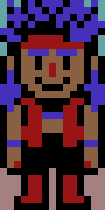
ROCK STAR
Cost 5 – !Trouble! – Earns 3 Pop, 2 Cash
As a Trouble guest, applications for Rock Stars are kind of limited. Buying out all four is probably asking for trouble, and without mitigation even one purchase will substantively increase the number of parties you’ll have to end early.
Synergies:
Good: Hippy, Cute Dog, Councilor, Writer, Bartender
Bad: Poor Trouble mitigation, other sources of Trouble (the more you have, the worse it gets)
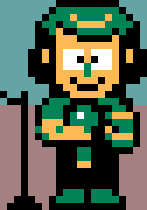
COMEDIAN
Cost 5 – Costs 1 Cash (at the end of a party)
Variable Pop (+5 if house is full)
Comedians are great. They’re the cheapest guest that, by themselves, can from a viable engine, a system by which you can earn enough Popularity to purchase the star guests you need to win the game. Good engine guests earn you large amounts of popularity if you play them correctly. All engine guests require a good strategy to make them pay off, and Comedians have one of the easiest to satisfy: all you have to do is not have any empty space when the party ends.
That means, you can’t end the party early. The only non-obscure reasons you’d end the party early are to avoid losing the round due to Trouble or overflow, or because you have more guests in your rolodex than house space, which almost never happens unless you’re trying to do it on purpose.
If the party fills completely and the Comedian pays out, you get five Pop. If the party doesn’t fill though, you get zero, nothing, nada. This means that early scoring guests like Greeter and Photographer are completely wasted on the Comedian–in fact, it’s worse than that, because you’ll be charged 1 Cash. That charge is probably the worst thing about the Comedian, making it hard to use in low money scenarios without it limiting the size of your house.
Needless to say, Introvert and Comedian are opposites. One does well when the other does poorly.
Synergies:
Good: Good Trouble mitigation, high money games
Bad: Bad Trouble mitigation, Introvert, Greeter, Photographer, bringers
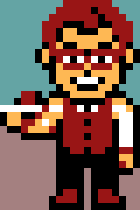
CATERER
Cost 5 – Earns 4 Pop, costs 1 Cash (at the end of a party)
In play Caterer is a lot like Comedian. They both have a 1 Cash charge. You get slightly less Pop from a Caterer than a Comedian that pays off, but you still get rewarded even if you have to end the party early, and early scorers, while they still charge you an extra buck, reward you with a Trouble-free 4 Pop. You’ll still have to watch how many you buy in a low money game.
Synergies:
Good: High money games
Bad: Low money games
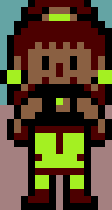
PHOTOGRPHR
(Photographer)
Cost 5 – Earns 1 Pop, costs 1 Cash (at the end of a party)
Scores any one other guest in the party of your choosing (early scorer)
Photographer is a guest with a lot of unexpected nuance that isn’t revealed in its description. Take Dancer for instance. Dancer’s description gives its payouts as a table, even thought the way it obviously works is that each Dancer is worth as much as how many Dancers are at the party total. So, if all four Dancers arrive, each Dancer scores for 4, for a total of 16. So Photographer should score a single Dancer at 4.
One might think that, but no: Photographer instead scores one Dancer for the value of ALL your Dancers, so you get 16 out of it! Yet other guests that have all copies get scored all at once (Mascot, Comedian, Writer, Bartender) still only get scored singly when activated with Photographer. Dancer is hard to make work, but Photographer makes her a lot more viable.
The other virtue of Photographer is that, since it scores right away, you get the value of the guest it works on even if the party later crashes out.
Note, though, that Photographer also charges you any Pop or Cash cost the guest it works on has. It scores the bad bits as well as the good ones. It doesn’t give out extra Trouble though.
Synergies:
Good: Dancer, Stylist, Climber
Bad: Guests with costs
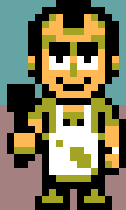
GRILLMASTR
(Grillmaster)
Cost 5 – Earns 2 Pop
Action: Send everyone outside (shuffler)
Grillmaster is a shuffler, a guest with an action that empties out your entire party and allows you to start filling it up from your rolodex again. Shufflers return everyone who was in your party, including themselves, to the pool of possible attendees, but they don’t refresh any actions for removed guests, and they don’t return evicted guests, whether due to booters, Cupids, guests barred from peekers, or anyone swapped out by a Magician to the deck. Scoring only happens for guests at your party when you end it, so it’s a way to get out of paying guests with costs, even if you’ve used any actions they have, so long as you don’t mind losing any end-of-party scoring they’d give you.
Shufflers can serve as a Trouble mitigation, since they return all Trouble guests in your party to the pool. The party will fill up again from the same pool of guests you had before though, so it’s still as prone for Trouble to come back. The best thing about Shufflers is their synergy with Climbers, which I’ll explain later.
Synergies:
Good: Trouble, Climber
Bad: Scenarios with lots of mitigators

GREETER
Cost 5 – earns 1 Pop
Brings one guest (early scorer)
Photographers and Greeters are Party House’s two “early scorers,” who can give you a guest’s rewards early. Doing this doesn’t mean they don’t also give you the guest’s award again, at the end of the party. It means you get it again. As with Photographer, you also get charged any penalties.
The difference between Photographer and Greeter is that Photographer charges you 1 Cash, but also lets you choose which guest, among those currently at the party, that you want to score. Greeter doesn’t charge anything itself, but has the drawback that it lets in the next guest at the door, whoever it is, and scores it immediately. You don’t get to directly control which guest it scores, although you can use a peeker to see what it is ahead of time, which can give you some control. Overall though, if you don’t have a strong use case for Greeter, it’s probably best to ignore them.
Synergies:
Good: Peekers
Bad: Guests with money costs
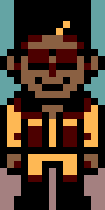
MR POPULAR
Cost 5 – Earns 3 Pop
Action: Brings one guest (bringer)
When Mr. Popular comes through the door, he always brings one other party member from your rolodex, if one exists. This guest is not optional. What happens if you don’t have room for another guest? The Fire Marshall shows up and shuts your party down for the night, and you get nothing.
Mr. Popular is your introduction to the other way you can lose a party: overflow. You lose far fewer parties to overflow than to Trouble, but if you have a bringer guest in your rolodex, you’ll still have to be careful. You might think you can get out of it if you always end your parties one guess before full capacity, and that usually works, but if you have multiple bringers in your deck, there’s always the chance one will bring another, and this chain can overflow your party when you’re as many spaces away from capacity as you have bringers left in your deck, although that’s fairly rare.
Another thing that than happen, if you have action-based Trouble mitigation, is a bringer can bring a Trouble guest that pushes you over the limit before you can do anything about it.
Synergies:
Good: Scenarios where you’re low on Pop sources, summoners, peekers
Bad: Trouble, scenarios where you have lots of Pop income options

WEREWOLF
Cost 5 – Earns 4 Pop
!Trouble! every other entrance
Werewolf is a strange one. The first time it enters the party (by either the door or summoning), it switches to wolf form, and it counts as Trouble. The next time it enters, it turns back into a human, and it’s not worth any Trouble. Either way, though, it’s worth 4 Pop! That’s pretty good!
How do you tell what a Werewolf will be? Whatever it is in your rolodex, its next appearance will be the other form. If it’s a wolf, it’ll show up as a human; if it’s human, it’ll become a wolf. It’s first appearance is always as a wolf.
Werewolves could form the core of a game-winning strategy, and because half the time they don’t count as Trouble, they aren’t as dangerous as other Trouble sources. In terms of deck composition, they count as roughly one-half Trouble. But they could count as even less than that, if your play your guests right. Even in decks with a lot of Trouble, sometimes you’ll have parties where they don’t get drawn. If you have a spare summoner and a wolf in the offing, you could wait until the last guest is about to come in, and if you aren’t at two Trouble, summon the Werewolf. It’ll show up as a wolf this time, when it won’t crash your party, and its next appearance will be as a human. And both times, you’ll get that 4 Pop! If you peek at a guest and it’s going to be a wolf, you could also decide if you can handle it now, or deny it entry and hope the next time it shows up you’ll in a better position to accomodate its wolfish needs.
Sometimes you’ll have better guests you’ll want to summon, and frequently you won’t peek a wolf before it enters. I still tend to rate a Werewolf as half Trouble, and it’s best to have some peacemakers in your rolodex to offset them. There’s more useful guests for earning Pop. But in random scenarios, sometimes Werewolf is your best bet.
Notice, Werewolf earns the same Pop as Monkey, but only causes Trouble half as often.
Synergies:
Good: Summoners, peekers, Trouble mitigation, scenarios without good Pop income, Writer, Bartender
Bad: Lack of mitigation
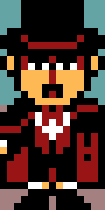
MAGICIAN
Cost 5 – Earns 1 Pop
Action: Swap out a Star guest and a non-Star guest, of your choosing
Magicians are best saved until the late game. If you don’t have any star guests in your rolodex, they’re just an expensive 1 Pop guest.
Magicians show their usefulness when you have star guests. Then, you can remove any non-star guest, and replace it with a random star guest from your rolodex. Presto change-o! The removed guest is gone from your deck for the rest of the party. Guests “transformed” like this cannot return until the next party, even if you use another Magician. You get to choose which guest in the party gets transformed (which can include the Magician himself), but you don’t get to pick the guest they’ll be replaced with, other than if it’s a non-star guest, it’ll be a star guest from your rolodex, and vice versa.
The end of every game of Party House is a race: in your remaining turns, you have to somehow get four star guests in the same party at once. Sometimes it’s hard, as in the case of games with a large rolodex. If your deck is very large relative to the size of your house, it’ll be unlikely that you’ll draw them all naturally, and that’s where summoners and Magicians come in handy. Even if you don’t draw a star guest, each summoner and Magician is a guest you could use to call up a star. Magicians are slightly better at this, because you don’t even have to have an empty space in your house for the star guest, you can swap out someone already there. You could even get rid of a burdensome Trouble guest in the process. And if you’re not ready to go for the win yet, you could use a Magician to get rid of a useless or costly star guest for someone who gives you income.
Since Magicians aren’t worth much Popularity themselves, it’s best not to buy any until you’re nearly at, or are already at, four stars in your rolodex, and you’ll often want to pick the used Magician as the swapped-out guest. In the rare circumstance where the starred guests in the deck are Unicorns, you could use a Magician to mitigate Trouble by calling one of them in, but swapping out the Trouble guest is pretty good on its own.
Synergies:
Good: Large decks, shufflers
Bad: Small decks, summoners
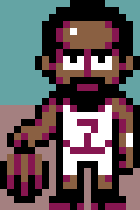
ATHLETE
Cost 6 – earns 1 Pop, 1 Cash
Action: Send everyone outside (shuffler)
Athletes are the same as Grillmasters, they just give you 1 Pop and 1 Cash instead of 2 Pop, and they cost one more Pop to buy. The Cash makes them a much better early buy, when you’re trying to expand your house quickly. I’ve had several games where I’ve bought out the Athletes and not touched any Grillmasters, during random games without money besides Athletes or Rich Pals.
Good: Trouble, Climber
Bad: Scenarios with lots of other mitigators often leave little reason for shufflers

GANGSTER
Cost 6 – !Trouble! – 4 Cash
Gangster sure looks tempting with that 4 Cash bonus. If there’s lots of peacemakers, or else Councilors, it might be worth it, or if you’re aiming for a large deck. Even in slightly large decks though, you’ll still have to make hard decisions as to whether to push your luck with Trouble, and that’s just with the four Wild Buddies you start with. I don’t buy Gangsters often unless I’m forced into it by the lack of other Cash. If money is scarce enough that you’re considering Gangster, I’d try to get by on Rick Pals until getting some mitigation, you’ll probably need then to dilute your rolodex anyway.
Synergies:
Good: Trouble mitigation, low money games, Writer, Bartender
Bad: Most cases

CUTE DOG
Cost 7 – Earns 2 Pop
Cancel one Trouble (peacemaker)
Cute Dog is one of the best deals in Party House. Peacemaking is always useful, and 2 Pop isn’t a bad extra. The smaller the deck, the more important peacemakers are. I’d go for Cute Dog before Hippy because that extra Pop adds up over the course of the game.
Synergies:
Good: Trouble, Writer, Bartender, Dinosaur
Bad: Lack of trouble, big decks
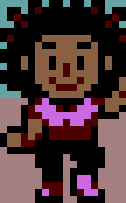
DANCER
Cost 7
Variable Pop (+1 for every Dancer in the party, including this one)
The first of Party House’s five preset scenarios, Alien Invitation, has a Dancer deck as one of its viable solutions, which is interesting to me because I rarely use Dancer otherwise. If there’s almost any high Pop option besides Dancer I’ll go for it, because to make Dancer pay off you have to draw a lot of them into the same party. If you’re going to buy one Dancer, you’ll want to buy all of them, or else they won’t be worth that much. A single Dancer is basically an expensive Old Friend; two are Watch Dogs without even the ability to peek. You need at least three to be worth it. At four, assuming you draw them all, they’re pretty good, but other guests can get you that too.
Think of this. If you have a deck with four Dancers, you have the same chance of drawing all of them into a party as drawing all four Wild Buddies, and just three of those brings the police. That is, you have a better chance of an unmitigated party bombing out than of getting your Dancers to pay out at maximum.
So to make Dancer work, you can’t rely on random drawing. Summoners let you decide to bring in Dancers instead of leaving it to chance. Shufflers give you more chances to draw all your Dancers. Peacemakers reduce the threat of Trouble ending your party early. But best of all are Photographers, especially if backed up by Cheerleaders, because of the scoring quirk I mentioned earlier: when a Photographer scores a Dancer, you get the full Pop for all of them instead of what that Dancer is proportionately worth.
Synergies:
Good: Photographer, Trouble mitigation, summoners, shufflers, lack of Pop alternatives, small decks
Bad: Big decks
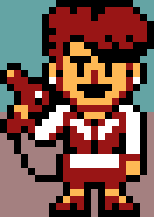
STYLIST
Cost 7 – Costs 1 Cash (at the end of a party)
Action: Increase the Popularity value of one guest in the party, of your choice, by 1
Stylist works by giving you an action that will permanently improve an individual guest by 1 Pop. It keeps this improvement for the entire rest of the game! It’s one of two guests that builds the value of guest over the course of the game. Both are best of bought early. Stylist is a little worse of the two Pop increasers because the start of the game is also when you need money the most to expand your house, and Stylists cost 1 Cash. I try not to buy building guests from the halfway point on (12 or less parties remaining) unless I have a particularly strong scheme for them, but both of them are powerful enough that by that point I usually have at least three of one of them anyway.
My strategy for deciding which guests to improve is to focus on those that give you Cash, since then if they show up you get both the Cash and their increased Pop. That especially helps in scenarios with summoners. I like to get a guest up to 9 Pop, the maximum, if possible, but I also like to nullify the -1 Pop penalty on Ticket Takers when I can.
One more thing… if the police or fire martial show up and end the party early, it can actually be a good thing if you’ve used a lot of Stylists that turn. You don’t have to pay, but you keep the Pop increases! Of course you still won’t be earning any Cash that party.
Synergies:
Good: Money guests, Cheerleader, summoners, Ticket Taker
Bad: Lack of money guests
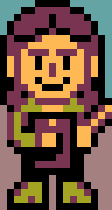
COUNSELOR
Cost 7
Action: Remove all Trouble immediately
Councilor has an action that outright turns Trouble guests into non-Trouble guests for the rest of the party. Even if you shuffle the party and start over, guests affected by Councilor won’t cause Trouble. That’s pretty great, and usually worth the complete lack of income. I’d say a councilor is effectively worth two peacemakers in deck composition.
The big drawback with Councilor, and it is a pretty big one, is that affected guests no longer boost Writers and Bartenders. Those guests are among the most potentially valuable in the game, especially if there are peacemakers, so if either of them are around you’ll have to be careful with your Councilors.
Synergies:
Good: Trouble guests
Bad: Bartender, Writer, peacemakers
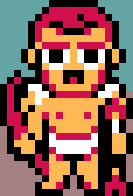
CUPID
Cost 8 – Earns 1 Pop
Remove two adjacent guests that are adjacent to each other (booter)
Most booters are useless for removing bad guests to make room for good ones, because the booter themself is a fairly low-value guest who must be present to use its action. Cupid is an exception though, because Cupid evicts two guests! They must be adjacent to each other horizontally to be removed — although the line of guests can wrap around the sides of the screen, vertically-touching guests are not considered adjacent. Unlike what seems to be implied by Cupid’s description, they don’t have to be adjacent to him, although Cupid can remove itself and one of its neighbors. You do have to remove two adjacent guests; you can’t just kick out one of them.
Because Cupid gets rid of more guests than itself, it has a unique quality that, in terms of deck composition, it’s almost never a bad idea to buy one. You might not buy one because of its fairly high Pop cost, or else its opportunity cost, but if you draw one you can usually find two low value guests to be rid of. One of them might even be Trouble, and in the worst case Cupid itself only gets you 1 Pop, so it might be one of the guests that you’ll kick out.
Both guests evicted by Cupid leave for the rest of the party, so Cupid works well with shufflers. Get rid of bad guests and, if the guests you don’t want don’t arrive, shuffle and give them another chance to show up at improved odds! With potentially four Cupids in your rolodex, you might be able to reduce the pool of possible guests to smaller than the size of your house, which isn’t great when it happens, but isn’t exactly awful either.
Synergies:
Good: Trouble guests, big decks, shufflers
Bad: Small decks
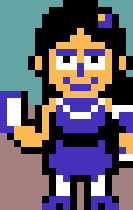
GAMBLER
Cost 7 – !Trouble! – Earns 2 Pop, 3 Cash
As yet another Trouble guest, each Gambler you buy makes the police crashing your party that much more likely to happen. I wouldn’t even think about getting one if there weren’t two of three in the scenario: Hippy, Cute Dog, Councilor.
Synergies:
Good: Trouble mitigation, low money games, Writer, Bartender
Bad: Most cases

SPY
Cost 8 – Earns 2 Cash
Action: Peek at next guest, and optionally reject them (peeker)
Spies are great guests. In many settings you’d want to get them anyway for their Cash income. Getting a peek at the next guest makes them even better. Peeking can even be used to mitigate Trouble sometimes: if you peek and see a Trouble guest and deny them entry, they’re gone until the next party. If you luck out and do that twice (and have no other Trouble in the rolodex) you can fill the party hazard-free, no matter how high the warning sound from opening the door gets.
But that Cash is the main attraction. Think of it this way. If you keep your rolodex composition roughly twice as large as your house, which is a strategy that works well for me, then assuming you buy a Spy in turn 5, it’ll turn up about 10 times in the game. That’s $20 over the course of a game from that one guest, enough for nearly two full-price house slots by itself. In practice though it’ll be worth several more than that.
Synergies:
Good: Greeter, guests with powerful benefits, Trouble, big decks, Auctioneer
Bad: Games with lots of money make it less useful

WRITER
Cost 8 – Earns 1 Pop
Adds 2 Pop for every Trouble in the party
Writer is one of two guests with an ability that gives you more income depending on how much Trouble is in your party when they score, and those are the most powerful combos in the game. Even if you don’t have any peacemakers, each Writer can get you up to 5 Pop per party, which is better than Dancer, and while you’d have to have six guests at the party instead of four Dancers, it scales up better, and uses some cards, Wild Buddies, that you’re stuck with anyway.
WITH peacemakers, well! Then it’s possible to get all your Wild Buddies into the party at once, and each Writer is worth 9! And if you have all of both Hippies and Cute Dogs, you might start looking into getting into a little extra Trouble, and Writer balloons in value. My best game of Party House won in night 18, with 7 turns left, and it was due to Writer and Bartender paying off huge like this.
if you’re flying close to the sun with Trouble, you might want to get a Councilor or two to help with the odds, but remember that Councilors work by removing the Trouble flag from everyone at the party, making Writer almost useless. Good for emergencies, but it’s always better if you’re saved by peacemakers.
Synergies:
Good: Bartender, peacemakers, shufflers, summoners, Councilor (if you’re careful)
Bad: Small houses
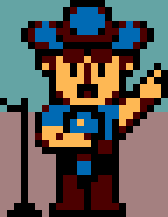
AUCTIONEER
Cost 9 – Earns 3 Cash
A very simple guest, worth a flat 3 Cash, but money is so important early in the game that it can be worth forgoing the first three turns to save up and make Auctioneer the first guest you buy. What I said about Spy, being worth around $20 during a game if bought on Turn 5, becomes $30 with Auctioneer, which is two-and-a-half late game house slots, and certainly will earn more. Auctoneer is so valuable that it’s worth summoning. The only guest with higher flat Cash income is Gangster, and its Trouble flag makes it much less of an obvious choice.
The thing about money though is it’s worth less and less towards the end of the game. You really need Pop in the final rounds. But that speaks in Auctioneer’s favor, not to its detriment: unlike its equivalent value in Rich Pals, an Auctioneer only takes up one spot in your rolodex, so it won’t block out a high-Pop guest, and can be dismissed with a single peeker or booter.
Synergies:
Good: Low money games, summoners
Bad: Nothing, really
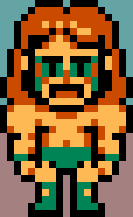
WRESTLER
Cost 9 – Earns 2 Pop
Action: Evict one guest
The same thing as Security but with 2 Pop. That makes it more useful, but at 9 Pop, not really that great either. As with Security it can kick out Trouble, but it’s usually better to deal with it with a peacemaker, or maybe a councilor. At least Wrestlers are themselves not bad earners, so it’s not as often a foregone conclusion that you’ll use its action to kick itself out.
Synergies:
Good: Trouble without other mitigation, Cheerleader
Bad: Any other way of dealing with Trouble
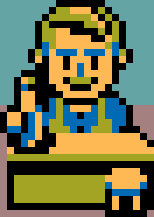
BARTENDER
Cost 11
Variable Cash (+2 for every Trouble in the party)
Bartender is the money version of Writer, and that makes it dynamite. Bartenders can become worth so much that you can overwhelm the Cash cap, of $30, in a single party. House slots stop getting more expensive at $12 each, so Bartenders are the most viable way of maxing out your house at 34 slots (which is basically impossible unless you’re focusing on doing that above winning). Best of all, if Writer is in the game too, their effects compliment each other, and swim in both Pop and Cash each party.
As with Writer, to make it really work you must have peacemakers too, or else each Bartender tops out at $4.
I should warn you: at the start of a game, after the first party, when you’re scanning your eyes over the available guests and trying to see what’s going to be difficult to earn, don’t forget that Bartender doesn’t have a money symbol on its graphic! If you forget, you might bulk out your deck with Rich Pals early, without realizing you have the best money earner in the game at hand. In that case Bartender is certainly the best first buy, even if you have to save up three turns to buy it.
Another warning: Bartender makes a worse purchase late in the game, when Cash decreases in power relative to Pop. But without the huge house that Cash income throughout the game allows, you can find it difficult earning the Pop you need for star guests, or finding the space for four star guests at once.
Synergies:
Good: Writer, peacemakers, shufflers, summoners, Councilor (if you’re careful)
Bad: Small houses (but that won’t be a problem for long)

CELEBRITY
Cost 11 – Earns2 Pop, 3 Cash
Brings two guests (bringer)
Celebrity is so difficult to use well. All of the problems with Mr. Popular, but she brings TWO guests with her! With Celebrity, to be (mostly) safe you’ll have to stop letting in guests while the house still has two slots left, and even then, if you have multiple bringers, they can chain together and overflow your party anyway. Note that Celebrity has the same bonuses as Gambler, yet it costs more.
If Celebrity brings in another bringer, then it adds its guests to the number waiting to arrive. So, if a Celebrity brings in another Celebrity as its first guest, after that point three more guests will come in without you being able to stop them.
EDIT: Formerly I said that Celebrity’s bring-in routine aborted if it brought in another bringer. This was in error.
The best way to deal with bringers is to summon them at a safe time, or deny them entry with peekers. Booters aren’t of use, as the damage has already been done once they’re in the door. Peacemakers can help you deal with brought Trouble passively. Note that, if a bringer is returned to the guest pool by a shuffler, they’ll bring in other guests all over again if they return.
Synergies:
Good: Summoners, peekers, peacemakers
Bad: Small houses
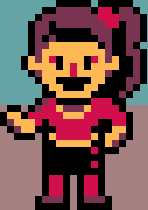
CLIMBER
Cost 12
Variable Pop (+1 every entrance)
Technically Writers and Bartenders can be worth more, but Climber, the most expensive non-starred guest, is much easier to use. Whenever a Climber enters the party, it automatically gains 1 Pop, up to a maximum of 9, for the rest of the game. That’s it.
Climber is amazing for a number of reasons. If you can get one in early (the earliest guarenteed time to buy a Climber is turn 4) it’ll be almost certain to reach a value of 9 by the end. And value-gaining Climbers, if gotten early enough, can themselves help you buy more Climbers.
The danger with Climber is buying it too late. Unless you have lots of shufflers, I wouldn’t buy one from the halfway point on, that’s too late to make enough return on your 12 Pop investment, and by that time you should be looking towards your first star guest anyway.
The bigger your deck, of course, the less likely you are to draw a Climber. But usefully, you can trigger them multiple times in a turn with shufflers, and can guarentee one will raise in value with a summoner. In a way, getting the actual Pop for a Climber on her way up is secondary, since every time she shows up after is an additional Pop she drags in. Even the police or fire marshall crashing your party may not be so bad, as Climbers get to keep the Pop they gained before their arrival.
Synergies:
Good: Shufflers, summoners, Photographers, Greeters
Bad: Big decks
* Star Guests *
Remember: you need four stars in your party at once before the end of turn 25 to win. If you get them, end your party immediately! You don’t want any authority figures showing up to ruin your achievement!
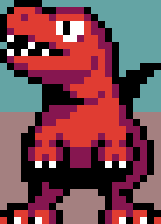
DINOSAUR
Cost 25 – !Trouble! – 1 Star
The cheapest star guest is the hardest to make good use of. At a total of just 100 Pop, it’s possible to save up enough for four Dinosaurs without buying any other guests, but without peacemakers or Counselors you won’t even be able to get three of them in your party at once before the police arrive, no doubt with backup from Jurassic Park. Even with Trouble mitigation they’ll probably wreck a party or two before the end.
Still though, 25 is an amazing deal, less than half the cost of the most expensive star guest. Even if you can’t go Full Dino, a single Dinosaur in a set with three more expensive stars can be just what you need to eke through to a win.
Dinosaurs don’t give you anything except a star and Trouble, so until it’s time to corral four of them in your door at once, feel free to boot their scaly asses into the cold.
Synergies:
Good: Counselors, peacemakers, summoners, booters
Bad: Lack of Trouble mitigation

DRAGON
Cost 30 – Costs 3 Cast (at the end of a party) – 1 Star
There’s a pattern among the star guests: cheap ones with significant difficulties, giving way as Pop cost grows to less severe problems, at 40 Pop there’s Alien, the guest with no problems or upsides, and then star guests that give you advantages are the really expensive ones.
Dragon is a bit of an anomaly. It’s true that $3 is a fairly big penalty, but cash becomes much less useful near the end. Most games played with a decent strategy will give you enough passive Cash to pay off the Dragon pretty reliably, and even if you can’t the 7 Pop penalty per dollar for not being able to pay a debt isn’t debilitating. Keep in mind, on the winning turn, you never get charged, so if you can kick out the Dragons every turn until then you never have to pay. Not that you’ll probably be able to do that, but every one you remove is three more dollars… probably to pay off later Dragons, but hey.
Synergies:
Good: High Cash income
Bad: Useful star guests
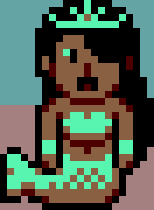
MERMAID
Cost 35 – 1 Star
Brings 1 guest (bringer)
Mermaid is the only bringer star guest, and all the problems with bringers explained elsewhere apply. They aren’t as bad as Celebrity, so that’s good. Since you won’t be getting Mermaids until you’re pushing for a win they aren’t so bad, since you’ll probably have a house of significant size by then. The biggest issue with an all-Mermaid win strategy is having enough room for all the Mermaids and their guests, but sometimes a Mermaid will bring another Mermaid, saving you a slot. All that really matters is that last space, so try to use summoners to bring them in before then.
Synergies:
Good: Summoners, peekers, peacemakers
Bad: Small houses
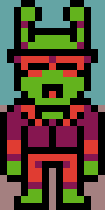
ALIEN
Cost 40 – 1 Star
Alien is the most boring star guest. This is brought home to you in the first scenario. They’re the Provinces of Party House, empty victory points. They bloat out your deck, and all they give you in return is, hopefully, a win.
Synergies:
Good: High Pop engines
Bad: Low Pop engines

UNICORN
Cost 45 – 1 Star
Cancel 1 Trouble (peacemaker)
Unicorn makes a good counterpart for Dinosaur. Note that the cost of a Unicorn and a Dinosaur is 70, while the cost for two Aliens is 80. The difference is made up by the chance of drawing the Dinosaur first.
Synergies:
Good: Trouble, Writer, Bartender
Bad: Games without Trouble besides your Wild Buddies, low Pop games

GHOST
Cost 45 – 1 Star
Action: Evict one guest (booter)
Ghosts are the guests that make booters useful. You can use them to boot themselves before you’re ready to win with them, or get rid of extra Trouble, it’s your choice. When it’s time to win, you can use them to make room for more Ghosts, for a proper Haunted Party House.
Synergies:
Good: Trouble
Bad: Low Pop games
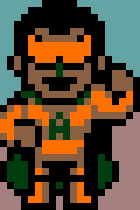
“What’s the A stand for?”
“Arbitrary.”
SUPERHERO
Cost 50 – Earns 3 Pop – 1 Star
Superhero is probably my least used star guest. If you’ve had a game that allows you to pick up 50 Pop Superheroes, you probably don’t need the 3 Pop income it brings you. If the other choice of a star is Dinosaur or Mermaid, and you have lots of Pop, you could get your stars from Superheroes, sure why not.
Synergies:
Good: High Pop games, Dinosaur & Mermaid (because it helps you avoid getting them)
Bad: Low Pop games
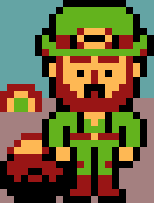
LEPRECHAUN
Cost 50 – Earns 3 Cash – 1 Star
If there’s still turns left at the end, a Leprechaun’s 3 Cash can help you expand your house that little bit extra to increase the chances of expanding more by the end of the game. For that reason it’s a better choice than Superhero.
Synergies:
Good: High Pop games
Bad: Low Pop games
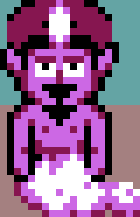
GENIE
Cost 55 – 1 Star
Action: Summon specific guest (summoner)
The best star guest, because it gets you through the issue of having to draw four stars randomly. If there’s four Genies in the rolodex, and enough room in your house, then all you have to do is draw one of them, then have that Genie summon another one, and repeat two more times. Or if you have another summoner, you can have them grab the first Genie, and you’ve won that way.
If Genies are in the scenario, then at least you know you don’t have to worry about keeping your deck size down in order to win.
The big drawback is that 55 Pop cost, the highest in the game. One thing that might help: you can skimp on one of the Genies, getting a cheaper star guest instead. So long as you get one of the Genies, you’ll still have one summoning left over for the last star, whatever it may be.
Synergies:
Good: High Pop games, other summoners, big decks
Bad: Low Pop games
Pause the game to access the Terminal, where you can enter these codes!
Using any code will invalidate the current Party House play session for all records, achievements and unlockables.
VIPS-ONLY: Allows you to set up a custom game, selecting the available guests. Using this you can have duplicate types of guests, and so get around the limit of four guests bought of each non-star type.
MAKE-GLEE: Lets you enter a scenario code, the kind that appears on the guest selection screen during Random Scenarios. If you want to attempt a hard scenario, try either 541896 or 339036.
